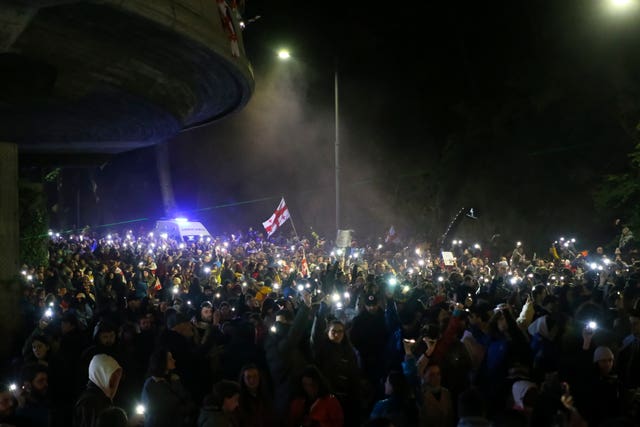Georgian president condemns ‘foreign influence’ law passed by parliament
President Salome Zourabichvili said the Bill, which has sparked major protests, is ‘unacceptable’.

Georgian President Salome Zourabichvili has said that a “foreign influence” Bill passed by parliament that critics have called a threat to free speech is “unacceptable”.
In an interview with the Associated Press, Ms Zourabichvili criticised the ruling Georgian Dream party for pushing the Bill, which is widely seen as a threat to Georgia’s aspirations to join the European Union.
The Bill requires media and non-governmental organisations and other non-profit groups to register as “pursuing the interests of a foreign power” if they receive more than 20% of their funding from abroad.
The government says the Bill is needed to stem what it deems harmful foreign actors trying to destabilise politics in the South Caucasus nation of 3.7 million people.

“It’s unacceptable because it reflects a turn of the Georgian attitudes towards the civil society, towards the media and towards the recommendations of the European Commission that are not consistent with what is our declared policy of going towards a European integration,” Ms Zourabichvili told the AP.
The president reaffirmed her intention to veto it because it “goes directly against the spirit or the letter of EU recommendations”.
Ms Zourabichvili is increasingly at odds with the Georgian Dream party, which has a majority sufficient to override it. She has until May 28 — 14 days after its passage — to act.
She emphasised it is her “duty under the constitution to make everything in my capacity possible to support the European integration and to consolidate it”.
Huge crowds of protesters have blocked streets in Georgian capital Tbilisi and milled angrily outside the parliament building after lawmakers on Tuesday approved the legislation despite strong criticism from the US and the EU.
The Bill is nearly identical to one that the Georgian Dream party was pressured to withdraw last year after street protests. Renewed demonstrations have rocked Georgia for weeks, with demonstrators scuffling with police, who used tear gas and water cannons to disperse them.
The opposition has denounced the Bill as “the Russian law” because Moscow uses similar legislation to crack down on independent news media, non-profits and activists critical of the Kremlin.
European Council President Charles Michel said on Tuesday that if Georgians “want to join the EU, they have to respect the fundamental principles of the rule of law and the democratic principles”.
White House press secretary Karine Jean-Pierre said the US was “deeply troubled” by the legislation, which she said “runs counter to democratic values and would move Georgia further away from the values of the European Union. And let’s not forget also Nato”.
Enacting the law “will compel us to fundamentally reassess our relationship with Georgia”, she added.
US assistant secretary of state for Europe and Eurasia Affairs James O’Brien met Prime Minister Irakli Kobakhidze on Tuesday and told journalists that “if the law goes forward out of conformity with EU norms, and there’s undermining of democracy here and there’s violence against peaceful protesters, then we will see restrictions coming from the United States”.





